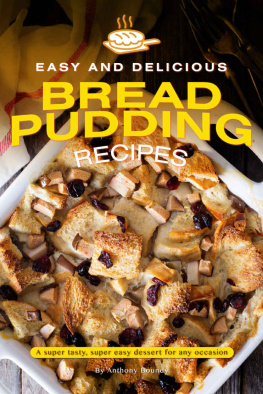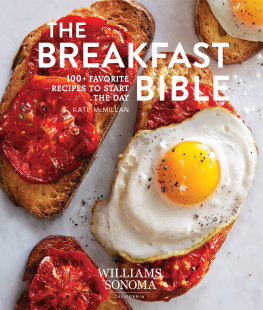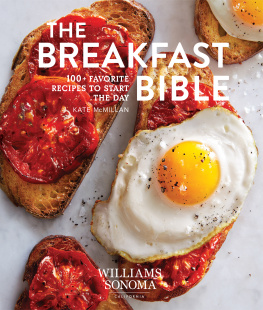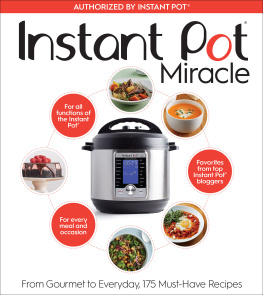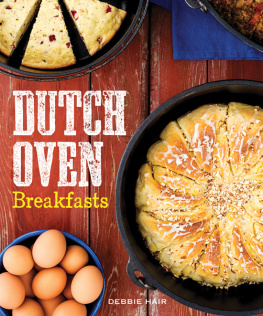
To G. Muratori on Farringdon Road, which was the best greasy spoon in London until it closed in sad circumstances early in 2012. Thank you for providing a place to meet and compare notes over sausage, egg and bubble.
Contents

In 2005 some friends and I started a website called The London Review of Breakfasts. We loved going out for breakfast but had recently been faced with a lot of bad ones (limp bacon, lukewarm tea, apathetic egg). Because nobody in the dinner-obsessed media was writing about the days foremost meal, we thought it would be fun to do so ourselves. Especially if we wrote using pen names made from breakfast puns like Blake Pudding, Tina Beans and Malcolm Eggs. One morning, I went online, wrote a few words about the pleasures and pitfalls of eating out for breakfast, and the website was born.
Strange things began to happen. People I didnt know got in touch, enquiring whether they too might assume secret identities and share their morning-meal experiences. They werent just writing from London, but from far-flung places such as Ohio, Iraq and Surbiton. Reporters started calling, asking for quotes about the decline or resurgence of the British fry-up. On planes and in pubs, everyone to whom I mentioned the subject wanted to tell me their breakfast routine (I have this unbelievable poached egg method) in meticulous detail, bordering on confessional. Increasingly it felt as though we had hit on something big: a vast, untapped reservoir of emotion, hidden in plain view, in the way we eat this bacon-and-eggy, marmaladey meal. Could it be, I wondered, that breakfast really is the most important meal of the day?
My interest in the subject began to mushroom. It was no longer enough to find excellent places that served breakfast; I wanted to understand what it meant. Have we always eaten the same thing at breakfast-time? What do they eat in India, China and the Middle East? How the hell do people make croissants? Why is the first pancake from a given batch always so unfortunately shaped? As the questions stacked up, they began to look like the contents page of a book one that ought to have been written but somehow hadnt. A collection of facts, stories and flighty theories, but above all a practical book, one that brought together classic breakfast recipes from Britain and beyond. I discussed it with the network of contributors who now populated The London Review of Breakfasts. We agreed it would be enjoyable to create it: a handbook for the breakfast-eating community. In other words, just about everyone, with the exception of that baffling subspecies who forswear the meal.
Of course, it wouldnt be the first book to have been written on the subject, and early in the three-year research process (more than a thousand breakfasts were eaten) I was lucky to meet serial breakfaster Tim Hayward, a man who owns historys most important breakfasting books and was happy to see them used for the greater good. We arranged to have waffles in Camden Town. He handed the books over. I lugged them home. Poring through the collection I opened up Breakfast Dishes by M. L. Allen, a pocket-sized volume from 1884 detailing one hundred or so expansive spreads such as porridge, broiled partridge, Winchester cutlets, poached eggs and bacon, grated ham on toast and strawberry jam. Then I leafed through Fifty Breakfasts, a vaguely famous book from 1904 by Colonel Arthur Robert Kenney-Herbert, a British soldier of the Madras cavalry who wrote under the pen name Wyvern. And there was Evelyn E. Cowies 1958 effort Breakfasts, with a mission both to satisfy ones appetite and raise ones spirits.
The culinary side was, naturally, interesting (broiled partridge?) but what I found curious was how all the authors had a problem the same problem with how breakfast was consumed. Allen hoped that her recipes would greatly facilitate a housekeepers efforts to vary the usual monotonous routine. This monotony, she believed, was something of which almost everyone complains. Wyvern nailed it more sharply, declaring that the ding-dong monotony of bacon and eggs alternated with eggs and bacon of many English breakfast tables is wholly inexcusable. As for Cowie, she made the bold prediction that the monotony which has marked the English breakfast for over a century is passing. Time and time again, it seemed, the breakfast writers of the Western world had spied the windmills of dingdong monotony, tilted their lances, and charged.
And then what? Was the tyranny of repetitious breakfasting swept away in a wave of heightened awareness, a Breakfast Spring? Look around you. Eggs and bacon. Cereal with semi-skimmed milk. Rocketing sales of porridge and yoghurt. As the centuries of sleepy mornings have mounted up, weve been deciding that, actually, we would like less choice. In 1660, the gluttonous diarist Samuel Pepys described a hungover breakfast of Mackrell, newly-ketched, cold turkey pie and a goose and a coller of brawne. Who today would whip that up before getting the train to the office, the bus to the classroom or the tractor to the field?
What if, when it comes to breakfast, monotony is a good thing? What if it gives us an opportunity for once, in these choice-crazy times to focus on improving whats there, rather than worrying about what might have been there instead? Here are the breakfast foods: there arent many, but let us make them as good as we can. Let each fried breakfast be like a different performance of the same play, and every stack of pancakes arrive like a rendition of one of those blues songs so old and familiar that no one remembers who wrote it any more. When was the last time you heard someone complain about how monotonous and predictable it is when, first thing in the morning, they are greeted by a sunrise?
Winnie the Pooh knew what was what. Heres one of his conversations with Piglet:
When you wake up in the morning, Pooh, said Piglet at last, whats the first thing you say to yourself?
Whats for breakfast? said Pooh. What do you say, Piglet?
I say, I wonder whats going to happen exciting today? said Piglet. Pooh nodded thoughtfully.
Its the same thing, he said.

The sun is always rising somewhere, which means breakfast is always just about to happen. Dinner time in Timbuktu is breakfast time in Brisbane. Wherever you are, whatever you are doing, there is a person in the world right now at this moment in the buffoonish zone between waking and breakfasting. Yawning. Considering a dream, then wham! the instinctive realisation that twelve hours have passed since food was last encountered.
This unknown breakfaster gets out of bed, performs a few hygiene- and clothing-related tasks, then eats. In the Middle East, she may enjoy piping-hot, mashed fava beans. In Hong Kong, he might sip yuanyang, a tea-coffee combination whose name refers to the conjugal love of Mandarin ducks. Wherever you go, the wonderful monotonies of morning food are played out in a slightly different way that reflects the idiosyncrasies of both a place and its people.
When we began exploring the international breakfasting classics, we wondered whether there was a common thread to be found, some universal stamp of breakfasthood that always appears, whatever the culture. It turned out not to be eggs, toast or cereal. It is very hard to draw a straight line through congee, fried seaweed and pop tarts. In fact, the theme was a familiar one repetition, or, as Wyvern would have complained, one thing alternating with another. But whereas the old books railed against this, the world is in favour. If we like breakfast, its because of the way in which, in the small variations we make banana or blueberries with our pancakes? Feta or halloumi on our
Next page


